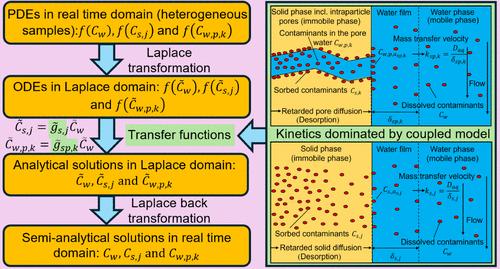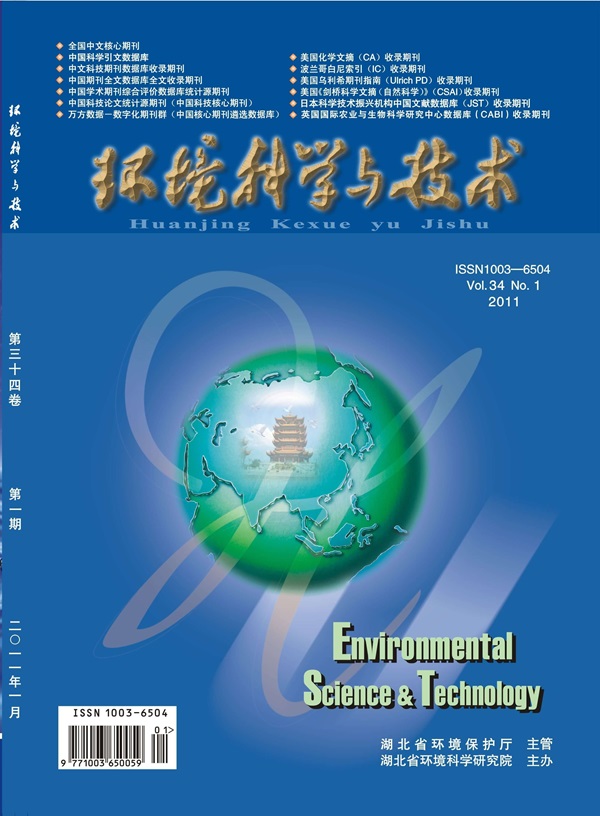Mechanistic Modeling of Pollutant Mass Redistribution (Sorption/Desorption) in Heterogeneous Systems Explaining Unexpected Slow Kinetics
IF 10.8
1区 环境科学与生态学
Q1 ENGINEERING, ENVIRONMENTAL
引用次数: 0
Abstract
Redistribution of pollutants between different solid phases occurs frequently in field and laboratory settings. Examples include the input of urban particles carrying pollutants into soils or rivers with suspended particles or passive sampling. Since multiple mass transfer mechanisms are involved and natural particles typically are very heterogeneous, modeling of sorption/desorption kinetics is challenging. Here, we present a semi-analytical model formulated in the Laplace domain to simulate pollutant redistribution kinetics in heterogeneous systems. The model accounts for a coupled process governed by intraparticle and external boundary layer diffusion, and it considers the heterogeneity of various sorbents (e.g., geometric shape, size, sorption capacity coefficient, and solid and porous particles). The model is validated against data of two batch experiments: (i) the redistribution of phenanthrene in spherical polyethylene particles of different sizes and (ii) redistribution of anthracene-d10 and phenanthrene in a heterogeneous sediment suspension with polyethylene passive samplers. It allows to explain the temporary overshooting of concentrations in the aqueous phase due to different kinetic controls of various particles involved (fast desorption vs. slow sorption) as well as initial fast kinetics followed by surprising long tailing in batch experiments. The approach is very flexible and can be used for many different scenarios.

异质系统中污染物质量再分布(吸附/解吸)的机理模型,解释意想不到的缓慢动力学过程
污染物在不同固相之间的再分布经常发生在现场和实验室环境中。例如,城市颗粒携带污染物进入土壤或河流的悬浮颗粒或被动采样。由于涉及多种传质机制,而且天然颗粒通常具有很强的异质性,因此吸附/解吸动力学建模具有挑战性。在此,我们提出了一个在拉普拉斯域中制定的半解析模型,用于模拟异质系统中的污染物再分布动力学。该模型考虑了颗粒内部和外部边界层扩散的耦合过程,并考虑了各种吸附剂的异质性(如几何形状、尺寸、吸附容量系数以及固体和多孔颗粒)。该模型根据两个批次实验的数据进行了验证:(i) 菲在不同尺寸的球形聚乙烯颗粒中的再分布;(ii) 蒽-d10 和菲在使用聚乙烯被动采样器的异质沉积悬浮液中的再分布。该方法可以解释水相中由于各种颗粒的动力学控制不同(快速解吸与慢速吸附)而导致的浓度暂时超调,以及批量实验中最初的快速动力学随后出现令人惊讶的长尾现象。这种方法非常灵活,可用于多种不同情况。
本文章由计算机程序翻译,如有差异,请以英文原文为准。
求助全文
约1分钟内获得全文
求助全文
来源期刊

环境科学与技术
环境科学-工程:环境
CiteScore
17.50
自引率
9.60%
发文量
12359
审稿时长
2.8 months
期刊介绍:
Environmental Science & Technology (ES&T) is a co-sponsored academic and technical magazine by the Hubei Provincial Environmental Protection Bureau and the Hubei Provincial Academy of Environmental Sciences.
Environmental Science & Technology (ES&T) holds the status of Chinese core journals, scientific papers source journals of China, Chinese Science Citation Database source journals, and Chinese Academic Journal Comprehensive Evaluation Database source journals. This publication focuses on the academic field of environmental protection, featuring articles related to environmental protection and technical advancements.
 求助内容:
求助内容: 应助结果提醒方式:
应助结果提醒方式:


